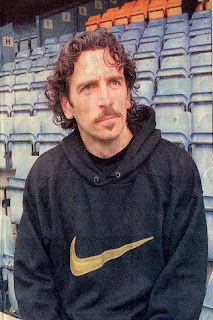I stood on the terraces at seven years old and watched my
first professional football match, it was a school friend’s birthday treat and I was invited to join him. A very
nice thing to do but nothing record breaking about watching your first game at
seven, many people watched their first game at a much younger age, the
difference being that I was the first person - adult or child - in my family to
have done that.
Richard in his school uniform around the time he enjoyed his first football match!
It had been less than a year before when I’d had my first
experience of playing football in any real sense, it was at school as part of a
PE lesson and then in the school yard at playtimes where teams were quickly
picked and pitched against each other. It seemed I was pretty good at it almost
immediately and I was hooked.
I grew up in a nomadic Romani family which meant I went to a
number of different schools and whilst I was aware of the games of cricket and
football they weren’t part of our culture so we didn’t play them. We played
throw and catch but that was mainly as hand-eye coordination practice for our
sports like quoits and competitive slingshot.
Discovering not only that I had a passion for the game but
also a talent for it, football became my thing I’m hesitant to say obsession
but as an ADHD person I guess the term would be hyper-focused.
It was the thing I thought about and talked about and
practised at home and there came the problem, none of my large family, close or
extended, were interested in the game and practising became a solitary
occupation. My Dad had no interest in the game at all in fact thought it was
pretty pointless yet even with four other children to share his time with and a
business to run he would take time out to stand and allow me, dressed in the
football strip that my mam had bought me, to take shots at him with the ball
he’d bought me.
I wanted to find out all I could about the game, its history
and how to play it better. The first thing I did was to go to the library and
get out as many books as I could on the subject and I read them from cover to
cover. One day after school my mam showed me a book she’d bought in a second
hand shop and I dove straight into my gift. The book written by Billy Wright
was a treasure trove of information and read from cover to cover many times and kept
safe along with my other prized possession, my football kit.
Book of Soccer by Billy Wright
Every new school or area I went to I found being able to
play football well was a major advantage often allowing my inclusion simply
because I could score goals. And for me when I was charging down the field with
the ball at my feet and with only one aim in mind to beat the goalie and help
my team win it was the most amazing feeling of freedom. When I did score my
team mates would pat me on the back and shake my hand, something boys would
rarely if ever do off the pitch.
As I got older as much as I loved the game I realised that I
wasn’t going to be able to pursue it any further. Whether you have the talent
and dedication or not, when you move around a lot, when your family culture is
different to the mainstream, when there are expectations placed upon you from
your culture it often means you have to make a choice, either or.
Richard at a football club in 1998
Which brings me to my book. A Different Kind of Freedom, set
in the early part of the last century, is the story of a boy from a Romani
family who wants to be a footballer. He encounters a huge amount of resistance
from his father but fortunately he finds inspiration in a real life hero who
has trodden the same path.
The novel was inspired by real life Victorian footballer Rab
Howell who was a pioneer in football in general being one of the first to become
a professional player who played for Rotherham, Sheffield United, Liverpool and
Preston and went on to also play for England. He also happened to have been
born and brought up in a nomadic Romani family.
I try to show in the book just how difficult it is to
overcome the increased obstacles you encounter both from inside and outside
when you come from a different background and emphasise the importance of
having a mentor and a role model.
I also wanted to show in the book which is also mirrored in
my own life that the game isn’t over until the final whistle blows. Whilst I
didn’t go on to play football professionally I did get the opportunity to work
with professional football clubs and enjoy the excitement, the ups, downs,
highs lows and the absolute joy of being on a winning team.
To find out more about Rab Howell and Richard's book visit the Time Tunneller's YouTube channel. https://youtu.be/7CjEgnJhfiA
A Different Kind of Freedom: A Romani story by Richard O'Neill is available from all good bookshops including
https://www.mirrormewrite.com/shop and
https://www.anewchapterbooks.com/product-page/a-different-kind-of-freedom-a-romani-story
Richard O’Neill is a multi-award award winning author and storyteller.
He is the recipient of the ‘National Literacy Hero’ award, the Beacon Leadership and a Royal Literary Society Award.
Raised in a traditional nomadic Romani family, he has a particular interest in using literature to promote inclusion and social mobility.
His books have received teacher awards in the UK and ‘Book-list’ awards in the USA and an Aesop medal.
Twitter @therroneill








